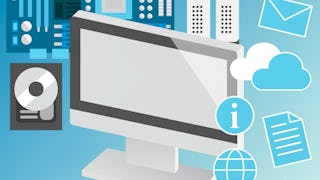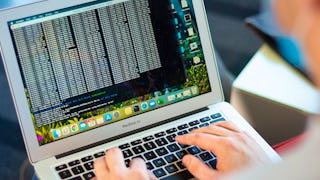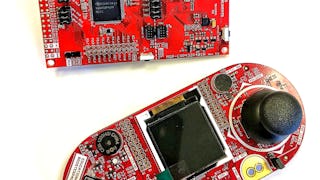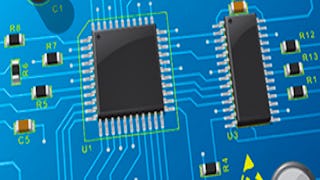Filter by
SubjectRequired
LanguageRequired
The language used throughout the course, in both instruction and assessments.
Learning ProductRequired
LevelRequired
DurationRequired
SkillsRequired
SubtitlesRequired
EducatorRequired
Explore the Hardware Course Catalog
 Status: Free Trial
Status: Free TrialSkills you'll gain: Microsoft Windows, Computer Hardware, Hardware Troubleshooting, Peripheral Devices, Disaster Recovery, Hardware Architecture, Networking Hardware, Computer Systems, Desktop Support, System Configuration, Operating Systems, Display Devices, USB, Computer Displays, Software Installation, Linux, Mac OS, Technical Support, Data Storage, File Systems
 Status: Free Trial
Status: Free TrialUniversity of California, Irvine
Skills you'll gain: Operating Systems, Computer Hardware, Hardware Architecture, Network Security, TCP/IP, Information Technology, Computer Networking, Computer Architecture, Network Protocols, Software Systems, General Networking
 Status: Preview
Status: PreviewSkills you'll gain: Computer Hardware, Hardware Architecture, Peripheral Devices, Computer Architecture, Data Storage, USB, Data Storage Technologies

University of Colorado Boulder
Skills you'll gain: Embedded Software, Software Design, Embedded Systems, Debugging, Hardware Architecture, System Programming, Microarchitecture, Software Architecture, Computer Architecture, Data Structures, C (Programming Language), Peripheral Devices
 Status: New
Status: NewSkills you'll gain: Network Protocols, Hardware Troubleshooting, Internet Of Things, Wireless Networks, Computer Programming Tools, Integrated Development Environments
 Status: Free
Status: FreePrinceton University
Skills you'll gain: Microarchitecture, Computer Architecture, Hardware Architecture, Computer Systems, Computer Engineering, Distributed Computing, Operating Systems, Performance Tuning, Scalability
What brings you to Coursera today?
 Status: Free TrialStatus: AI skills
Status: Free TrialStatus: AI skillsGoogle
Skills you'll gain: Package and Software Management, Systems Administration, Computer Networking, IT Infrastructure, OSI Models, Desktop Support, Information Systems Security, Network Troubleshooting, Technical Support, Routing Protocols, Computer Hardware, Network Security, Cybersecurity, Microsoft Windows, Network Administration, Lightweight Directory Access Protocols, File Systems, Interviewing Skills, Applicant Tracking Systems, Resilience
 Status: Free Trial
Status: Free TrialUniversity of Colorado Boulder
Skills you'll gain: Field-Programmable Gate Array (FPGA), Hardware Design, Application Specific Integrated Circuits, Electronic Hardware, Electronics Engineering, Electrical and Computer Engineering, Computational Logic, Verification And Validation, Technical Design, Computer Engineering, Simulation and Simulation Software, Systems Design, Development Testing, Test Engineering, Functional Testing
 Status: Free Trial
Status: Free TrialSkills you'll gain: Computer Networking, OSI Models, Network Troubleshooting, Routing Protocols, Network Administration, General Networking, TCP/IP, Network Architecture, Network Routing, Networking Hardware, Network Protocols, Virtual Private Networks (VPN), Network Infrastructure, Local Area Networks, Dynamic Host Configuration Protocol (DHCP), Wide Area Networks, Wireless Networks, Network Security, Network Model, Data Integrity
 Status: Free Trial
Status: Free TrialMicrosoft
Skills you'll gain: Generative AI, Computer Systems, Business Software, Technical Consulting, Business Systems, Computer Hardware, System Support, Information Technology, Servers, Enterprise Security, Artificial Intelligence, Data Storage, Operating Systems, System Configuration, Technical Support, Computer Architecture, Cybersecurity

University of Maryland, College Park
Skills you'll gain: Hardware Design, Security Engineering, Hardware Architecture, Computer Hardware, Threat Modeling, Cybersecurity, Security Controls, Application Specific Integrated Circuits, Cryptography, Intrusion Detection and Prevention, Encryption, System Design and Implementation
 Status: Free Trial
Status: Free TrialUniversity of Colorado Boulder
Skills you'll gain: Field-Programmable Gate Array (FPGA), Hardware Design, Application Specific Integrated Circuits, Electronic Systems, Electronic Hardware, Electronics Engineering, Embedded Systems, Embedded Software, Electrical and Computer Engineering, Semiconductors, Integrated Development Environments, Software Development, System Design and Implementation, Computational Logic, Software Development Tools, Computer Engineering, Verification And Validation, Technical Design, Computer Architecture, Simulation and Simulation Software
In summary, here are 10 of our most popular hardware courses
- Introduction to Hardware and Operating Systems: IBM
- Computer Hardware and Software: University of California, Irvine
- Introduction to Contemporary Operating Systems and Hardware 1a: Illinois Tech
- Embedded Software and Hardware Architecture: University of Colorado Boulder
- Mastering Hardware Protocols with ESP32 and Arduinos: Packt
- Computer Architecture: Princeton University
- Google IT Support: Google
- Hardware Description Languages for FPGA Design: University of Colorado Boulder
- The Bits and Bytes of Computer Networking: Google
- Introduction to Computers: Microsoft










